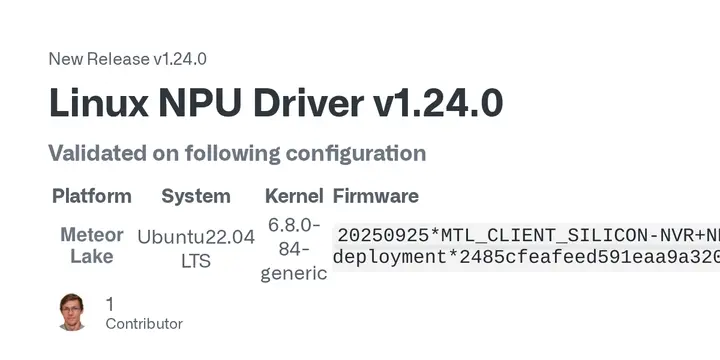The new driver has been tested across various configurations, including Intel client CPUs and Ubuntu operating systems, specifically versions 22.04 LTS and 24.04 LTS. It supports different kernel versions, such as 6.8.0-87-generic for Meteor Lake and 6.14.0-35-generic for newer setups. The installation also necessitates the use of specific software tools like Level Zero (v1.24.2) and OpenVINO (version 2025.3), alongside a particular NPU Compiler version (npu_ud_2025_44_rc1). Moreover, compatibility has been confirmed with various GPU driver versions, making it essential for users to ensure they match their setups with the tested combinations for optimal performance.
Intel has also indicated that support for Ubuntu 22.04 will be discontinued in future driver releases, urging users to transition to newer versions to maintain functionality.
The advancements in version 1.26.0 highlight Intel's commitment to enhancing AI processing capabilities, while also emphasizing the importance of using the right firmware for each specific configuration to ensure seamless operation.
In conclusion, users looking to leverage these enhancements for AI tasks should carefully review their hardware and software configurations, consider the upcoming changes in support, and ensure they are utilizing compatible firmware with their NPU setups. This proactive approach will facilitate optimal performance and longevity of their AI processing capabilities
Linux NPU Driver v1.26.0 released
Intel has released an update, version 1.26.0, of its Linux driver for Neural Processing Units (NPUs), specifically designed for artificial intelligence tasks on certain CPUs like Meteor Lake and Lunar Lake. To use the NPU feature, users need to ensure their system's hardware supports it and they have the right software, including a compatible NPU integrated chip. The new driver has been tested with different setups involving Intel client CPUs, Ubuntu operating systems, and specific kernel versions, alongside other tools like Level Zero software and OpenVINO. Additionally, each setup requires its exact matching firmware to function properly, which needs to be used as tested for the specific combination.


